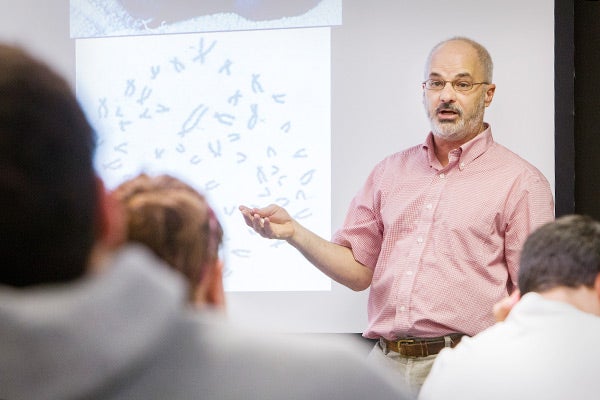‘LIGHT BULB’ MOMENTS
Biology professor receives UNC Board of Governors teaching award
The most rewarding thing about teaching biology for Dr. John Stiller is also the most difficult: Helping students reach those “light bulb” moments in which they obviously have grasped the material.
After years of helping students do just that, Stiller has been named one of the recipients of the 2012–13 UNC Board of Governors’ Award for Excellence in Teaching. The award is given annually to one educator from each of the 17 UNC-system schools to honor outstanding contributions in the classroom.
For Stiller, the most important characteristic of a good teacher is that the educator must genuinely care about his or her students and help them reach their intellectual goals.
“Not everyone who becomes an instructor is a gifted speaker, can make beautiful, artistic slides, or brings a natural sense of humor into the classroom,” Stiller said. “Students will forgive many sins in classroom delivery, or in research mentorship, as long as they believe the teacher is genuinely on their side and supportive of their efforts and aspirations.”
In addition to his academic accomplishments, Stiller has served as the president of the Phycological Society of America, received the National Science Foundation CAREER Award and published 31 scholarly articles. As a winner of the Award for Excellence in Teaching, Stiller will receive a commemorative bronze medallion and a $7,500 cash prize.
Read more about Stiller’s teaching experiences in the Q&A below.
Q: What led you to go into teaching?
A: It’s probably going to sound clichéd, but I’d have to say that some of the teachers I encountered during my years as a student had the greatest impact on my decision to pursue a career in education. Much of high school and college is now blurred in my memory, but I can recall with crystal clarity moments of real intellectual excitement and even exhilaration. Almost all of them were inspired by interactions with a dedicated instructor and/or mentor.
Q: What’s the most rewarding and challenging aspect of teaching science?
A: [The] most rewarding aspects probably are what I like to call “light-bulb” moments, when I see that look of excitement combined with deep clarity appear in the eyes of a student, particularly one who’s been struggling with the material. It’s probably also the biggest challenge to figure out how to flip the switch that turns on the bulbs of all students in a class.
Q: Describe how you mentor undergraduate and graduate students in their research. What’s your part in that?
A: My role with student researchers at all levels is to facilitate their personal explorations of hands-on science. Rather than handing students pre-designed projects, I try to give them as much freedom as possible in creating and implementing their research. Although becoming proficient in requisite techniques is important, my ultimate goal for student researchers is that they develop their abilities to analyze, interpret and extend the body of knowledge they develop. Whether students go on to careers that employ some of the specific techniques they learn, more general observational and analytical skills developed through scientific research will serve them well, regardless of their future directions.
Q: Do you have a favorite memory from teaching at ECU?
There are so many. One that always brings a smile to my face comes from one of my very first times teaching introductory biology to a class of 250 mostly first-semester, freshman students. Early in the semester, I was grading a quiz that included a question related to the evolutionary origin of complex cells. I came upon a quiz, on which the student wrote something along the lines of “I don’t believe in evolution so I didn’t study that material” in place of an answer to the question.
I decided the best approach was to write an email response to the student, basically replying that, regardless of her personal beliefs on evolution, it was important that she understand its principles and how the theory fits into the science of biology. It turned into a fairly long and philosophical note, discussing the need to be open to all kinds of knowledge, and the importance of learning about ideas, approaches and belief systems beyond one’s own frame of reference. I heard nothing back and I was a bit worried that the student might drop the class, so I was relieved to find her quiz in the pile the following week. I was also gratified to see her name move to the top of class when I graded subsequent quizzes and exams.
###
